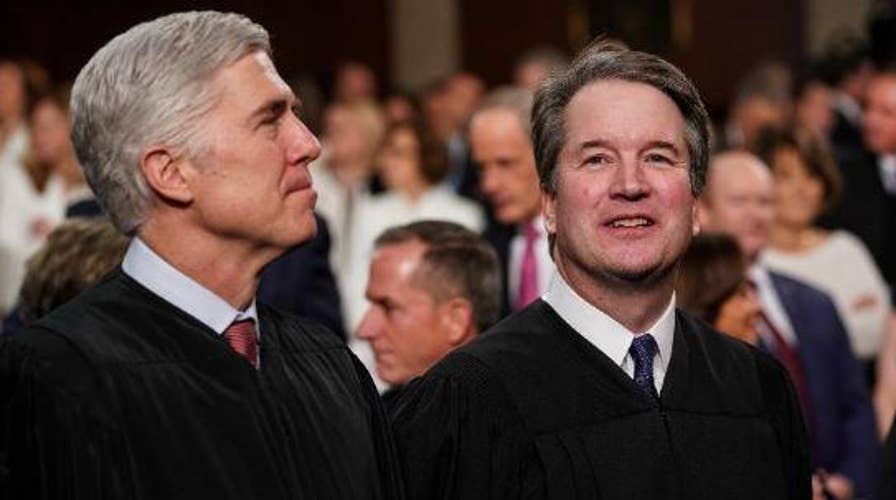Neil Gorsuch and Brett Kavanaugh find themselves on opposing sides in two out of three recent rulings
Neil Gorsuch and Brett Kavanaugh, President Trump’s two U.S. Supreme Court appointees, find themselves on opposing sides in two out of three recent rulings.
The Supreme Court’s conservatives on Wednesday could overturn a decades-old precedent -- for the third time in recent weeks -- a potential trend raising questions about the current court's willingness to upend another longstanding decision: Roe v. Wade.
The high court on Wednesday will consider a longstanding decision that gives power to federal agencies to tell businesses what their regulations actually mean.
KAVANAUGH AND GORSUCH DEFY DEM PREDICTIONS WITH INDEPENDENT STREAK
But the recent tendency to overturn existing precedents has raised alarm bells among left-leaning activists and justices over fears that the landmark 1973 ruling on abortion rights could be next, Bloomberg reported.
“Today’s decision can only cause one to wonder which cases the court will overrule next,” dissenting Justice Stephen Breyer wrote last month after the high court overrode a 1979 precedent that states are shielded from private lawsuits in other states’ courts.
“Today’s decision can only cause one to wonder which cases the court will overrule next.”
“Well, that didn’t take long,” Justice Elena Kagan wrote after another precedent was overruled. “Now one may wonder yet again.”
In such rulings, the so-called conservative bloc, consisting of Chief Justice John Roberts and Justices Clarence Thomas, Samuel Alito, Neil Gorsuch and Brett Kavanaugh, formed a slim 5-4 majority.
This, despite the fact that President Trump’s nominees, Gorsuch and Kavanaugh, went to great lengths during their confirmation hearings to reiterate their respect for the court’s precedents.
Kavanaugh said during his confirmation hearing that Roe v. Wade was “an important precedent of the Supreme Court that has been reaffirmed many times,” adding that Planned Parenthood v. Casey, a 1992 abortion case, reaffirmed Roe’s central holding, as “precedent on precedent.”
It remains unclear how the high court might rule on the issues of abortion. Last month, the court turned away a case regarding abortions based on an unborn child’s race or gender.
GORSUCH SIDES WITH LIBERALS IN SHOOTING DOWN TOUGHER SENTENCES FOR GUN CRIMES
But while the conservative bloc sometimes overturns cases, the Trump-appointed justices have exercised an independent streak and have sided with liberals on multiple rulings.
“The defining characteristic of both Justice Gorsuch and Justice Kavanaugh is that they have a very solid judicial philosophy. It’s not a political approach to the cases where you say what the outcome of this case is going to be and now find a judicial and legal rationale," Carrie Severino, with the conservative Judicial Crisis Network, told Fox News.
"It starts with the law, and it starts with how we interpret this law and using the same type of interpretive techniques regardless of what the real world political results may be, but having a consistent legal approach," she continued. "That doesn’t always lead to results that one might characterize as liberal or conservative."
"That doesn’t always lead to results that one might characterize as liberal or conservative."
Both Gorsuch and Kavanaugh have appeared to show more independence in a series of rulings than the so-called liberal bloc of the Supreme Court.
CLICK HERE TO GET THE FOX NEWS APP
“I think there’s less consensus than maybe was expected between the conservatives; the liberals seem to still be voting very heavily together,” Adam Feldman, a Supreme Court expert who runs the blog Empirical SCOTUS, told Fox News.
“When we look at the voting blocs, liberals voted together about 92 percent of the time. When you look at any of the iteration of the conservatives, at maximum they are voting together 75 percent of the times.”






